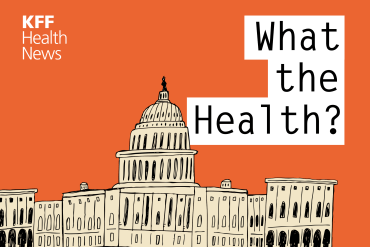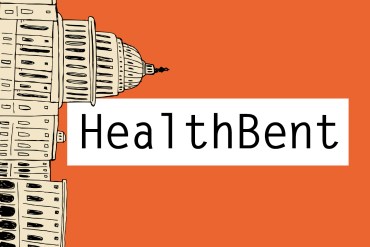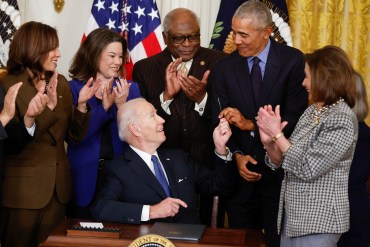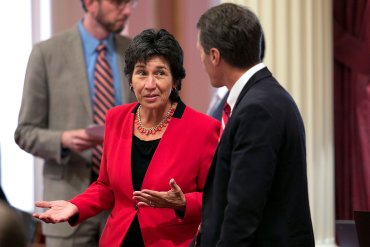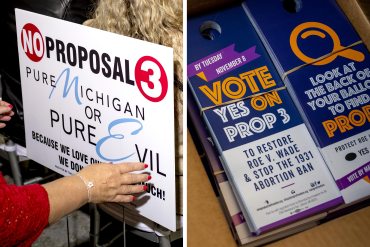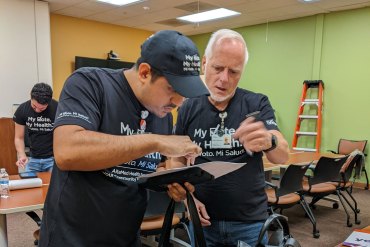KFF Health News' 'What the Health?': Congress Is Out. The Presidential Campaign Is In.
Congress is in recess until after Labor Day, and lawmakers won’t have much time when they return to get the government funded before the next fiscal year. Meanwhile, the Republican campaign for president has begun in earnest, and while repealing the Affordable Care Act is no longer the top promise, some candidates have lively ideas about what to do with federal health programs. Alice Miranda Ollstein of Politico, Sandhya Raman of CQ Roll Call, and Lauren Weber of The Washington Post join KFF Health News’ chief Washington correspondent, Julie Rovner, to discuss these issues and more. Also this week, Rovner interviews KFF Health News’ Phil Galewitz, who reported the latest KFF Health News-NPR “Bill of the Month,” about how a bill that should never have been sent created headaches for one patient.
What does a day in the life of the nation’s top health official really look like? And how much of their agenda is set by the White House? In this special episode of KFF Health News’ “What the Health?” — taped before a live audience at Aspen Ideas: Health, part of the Aspen Ideas Festival, in Aspen, Colorado — host and chief Washington correspondent Julie Rovner leads a rare conversation with the current and two former U.S. secretaries of Health and Human Services. Secretary Xavier Becerra and former secretaries Kathleen Sebelius and Alex Azar talk candidly about what it takes to run a department with more than 80,000 employees and a budget larger than those of many countries.
KFF Health News' 'What the Health?': When an Anti-Vaccine Activist Runs for President
Robert F. Kennedy Jr.’s official entry into the presidential race poses a thorny challenge for journalists: how to cover a candidate who’s opposed to vaccines without amplifying misinformation. And South Carolina becomes the latest state in the South to ban abortion after roughly six weeks of pregnancy. Alice Miranda Ollstein of Politico, Rachel Cohrs of Stat, and Sarah Karlin-Smith of the Pink Sheet join KFF Health News chief Washington correspondent Julie Rovner to discuss these issues and more. Also this week, Rovner interviews KFF Health News senior correspondent Aneri Pattani about her project to track the billions of dollars coming from opioid makers to settle lawsuits.
Why Do Politicians Weaponize Medicare? Because It Works
Politicians are again pointing fingers over who wants to cut Medicare. As past Washington brawls show, the party accused of threatening popular entitlements tends to lose elections — although it’s the beneficiaries relying on lawmakers to fund it who stand to lose the most.
KFF Health News' 'What the Health?': Au Revoir, Public Health Emergency
The Biden administration this week announced it would let the covid-19 public health emergency lapse on May 11, even as the Republican-led House was voting to immediately eliminate the special authorities of the so-called PHE. Meanwhile, anti-abortion forces are pressuring legislators to both tighten abortion restrictions and pay for every birth in the nation. Margot Sanger-Katz of The New York Times, Rachel Roubein of The Washington Post, and Victoria Knight of Axios join KHN’s chief Washington correspondent Julie Rovner to discuss these issues and more. Also this week, Rovner interviews Hannah Wesolowski of the National Alliance on Mental Illness about the rollout of the national 988 suicide prevention hotline.
Abortion Debate Ramps Up in States as Congress Deadlocks
Abortion is a top issue for state lawmakers meeting for their first full sessions since Roe v. Wade was overturned.
The debt ceiling crisis facing Washington puts Medicare and other popular entitlement programs squarely on the negotiating table this year as newly empowered Republicans demand spending cuts. Meanwhile, as more Americans than ever have health insurance, the nation’s health care workforce is straining under the load. Joanne Kenen of the Johns Hopkins Bloomberg School of Public Health and Politico, Tami Luhby of CNN, and Victoria Knight of Axios join KHN’s chief Washington correspondent Julie Rovner to discuss these topics and more. Plus, for extra credit, the panelists recommend their favorite health policy stories of the week they think you should read, too.
Numbers Don’t Lie. Biden Kept His Promise on Improving Obamacare.
KHN has teamed up with our partners at PolitiFact to monitor 100 key promises made by Joe Biden during the 2020 presidential campaign — including those surrounding the Affordable Care Act.
Ask Voters Directly, and Abortion Rights Wins Most Ballot Fights
Anti-abortion candidates have fared well in recent elections. But decades of ballot initiatives — including a half-dozen measures considered after the Supreme Court overturned Roe v. Wade last June — show that when voters are asked directly, they usually side with preserving abortion rights.
California Senate’s New Health Chair to Prioritize Mental Health and Homelessness
California state Sen. Susan Talamantes Eggman of Stockton has been appointed chair of the Senate’s influential health committee. A licensed social worker, Eggman said she will make mental health care and homelessness front-burner issues.
After Election Win, California’s AG Turns to Investigating Hospital Algorithms for Racial Bias
Attorney General Rob Bonta handily won election on a progressive, social justice platform. He’s already begun with an inquiry into hospital software programs that might bake in racial discrimination.
KHN’s ‘What the Health?’: The Changing of the Guard
Democrats retained control of the U.S. Senate in the midterm elections, while Republicans won a majority in the House, giving them the ability to block items on President Joe Biden’s agenda. Meanwhile, the lame-duck, Democratic-led Congress won’t have the votes to pass abortion rights legislation, although they may try to undo some long-standing anti-abortion policies in federal spending bills. Joanne Kenen of the Johns Hopkins Bloomberg School of Public Health and Politico, Victoria Knight of Axios, and Alice Miranda Ollstein of Politico, join KHN’s Julie Rovner to discuss these topics and more.
Fight Over Health Care Minimum Wage Yields a Split Decision in Southern California
Voters in Inglewood were poised to approve a union-backed $25 minimum wage for workers at private hospitals and facilities, while Duarte voters rejected it.
Journalists Tackle the Midterms and Open Enrollment
KHN and California Healthline staff made the rounds on national and local media this week to discuss their stories. Here’s a collection of their appearances.
KHN’s ‘What the Health?’: The Midterm Shake-Up
Election night went better than expected for Democrats. Although they could still lose control of one or both houses of Congress, the predicted “red wave” for Republicans failed to materialize. Meanwhile, voters in both red and blue states approved ballot measures to protect abortion rights. Alice Miranda Ollstein of Politico, Rachel Cohrs of Stat, and Sarah Karlin-Smith of the Pink Sheet join KHN’s Julie Rovner to discuss these topics and more. Also this week, Rovner interviews Carolee Lee, the former jewelry magnate, about her efforts to boost gender equity in medical research.
South Dakota Voters Approved Medicaid Expansion, but Implementation May Not Be Easy
South Dakotans voted to expand the state’s Medicaid program to cover thousands of additional low-income residents. But as other conservative states have shown, voter approval doesn’t always mean politicians and administrators will rush to implement the change.
El tema del aborto ayuda a los demócratas a minimizar pérdidas en estas elecciones
Entre otros problemas que enfrentaron los votantes el martes, los residentes de Dakota del Sur aprobaron una expansión de Medicaid bajo la Ley de Cuidado de Salud a Bajo Precio.
Abortion Issue Helps Limit Democrats’ Losses in Midterms
Although control of Congress was still undecided Wednesday, Republicans seemed poised to take power in the House, while the fate of the Senate remained too close to call. Economic issues were at the top of voters’ minds, but abortion access also played a large role in their decisions.
Listen: With Abortion Rights on the Ballot in Michigan, Women Tell Their Stories
Women who need abortion care come to Michigan from surrounding states that already have banned the procedure. A clinic in suburban Detroit allowed a reporter to interview patients, doctors, and nurses to understand what is at stake as voters decide whether to guarantee abortion access in the Michigan Constitution.
Voluntarios electorales quieren que los latinos sepan que votar es bueno para su salud
En los últimos años, las instituciones de atención de salud a lo largo de todo Estados Unidos han realizado esfuerzos para promover el voto, inspiradas por la creciente creencia de que votar mejora la salud de las personas y las comunidades.


